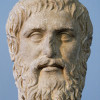“ In imaginative persons, especially, the God and beast in man seem to part asunder more than is natural in a well-regulated mind. ”
Plato, Symposium. copy citation
| Author | Plato |
|---|---|
| Source | Symposium |
| Topic | God mind |
| Date | |
| Language | English |
| Reference | |
| Note | Translated by Benjamin Jowett |
| Weblink | http://www.gutenberg.org/files/1600/1600-h/1600-h.htm |
Context
“The singular part of this confession is the combination of the most degrading passion with the desire of virtue and improvement. Such an union is not wholly untrue to human nature, which is capable of combining good and evil in a degree beyond what we can easily conceive. In imaginative persons, especially, the God and beast in man seem to part asunder more than is natural in a well-regulated mind. The Platonic Socrates (for of the real Socrates this may be doubted: compare his public rebuke of Critias for his shameful love of Euthydemus in Xenophon, Memorabilia) does not regard the greatest evil of Greek life as a thing not to be spoken of;”
source



